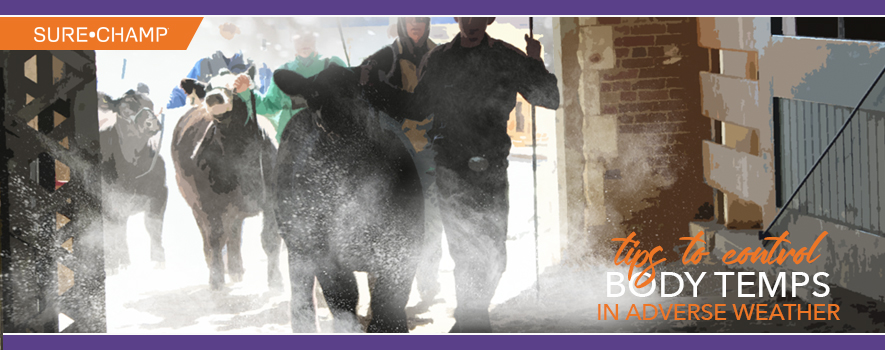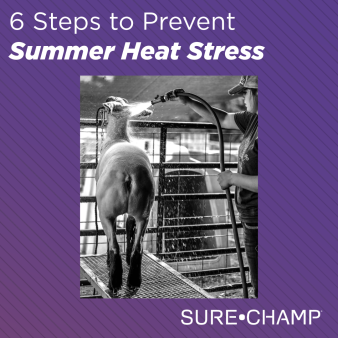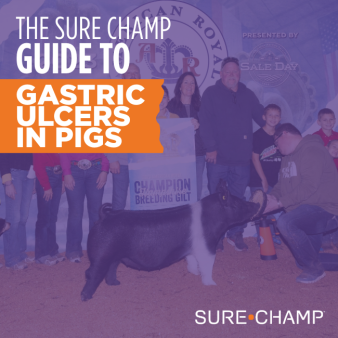
From an outsider looking in, the life of a show animal might seem pretty pampered. Two healthy meals per day, unlimited fresh water, a nice bed to lay on that is generally cleaned up on a regular basis, typically in a temperature-controlled environment. Combine those comforts with regular skin and hair treatments by way of rinsing, washing, brushing and conditioning, and show animals do live a good life. But, for an animal with a thick “fur” coat that divides its time between the chilly outdoors and inside a barn, battling heat stress in winter months can have a greater impact because of the dramatic fluctuation in temperatures.
One of the primary causes of heat stress in the winter is the digestive system working overtime to break down the feed. Exhibitors often feed a higher-energy diet to meet nutrient requirements in the colder months. Therefore, the rumen works extra hard to break down the feed, creating extra internal heat in the animal.
Because temperature is not the only measurement associated with heat stress, show livestock tend to express signs of heat stress more often than livestock in their natural habitat. Heat stress is related to ambient temperature along with humidity and air movement. When the humidity increases the animal’s evapo-transpiration is reduced, and it cannot cool itself. This inability to cool itself increases the core body temperature.
“When we lead these haired-up show cattle in to a hot, humid barn with little air movement from the cool tie-outs, their body temperatures increase significantly,” said Blaine Rodgers, Show Livestock Business Development & Field Support for BioZyme® Inc. “Livestock start to experience heat stress at 70-degrees, and we know from personal experiences those barns can be hotter than 70. We also need to remember that their rumen is working extra hard to break down their feed, raising their internal temperature even more.”
Besides digestion and extreme Temperature Heat Indexes (THI) created in hot, humid barns, other causes of heat stress at winter shows include extreme temperature shifts when traveling between climates and altitudes and walking long distances from tie-outs into a hot barn. Traveling to a show in a poorly ventilated trailer can also cause unneeded heat stress.
Heat stress can wreak havoc on your show animals’ overall health, causing challenges with their digestive, respiratory, immune and reproductive systems. Livestock will go off feed and water when they are stressed, they start to breath heavily, which can lead to respiratory issues. As well, their immune system is compromised which could result in additional health challenges.
However, heat stress doesn’t need to stress you out. One way to help your show animals beat heat stress is with products developed by Sure Champ® that help all show livestock lower their body temperature in a safe, fast, and natural way using the Amaferm® advantage. Sure Champ Extreme and Vita Charge® Climate Control Gel are two easy-to-use supplements to make sure your animals stay healthy and help regulate body temperature. Sure Champ Extreme is a pelleted, daily supplement designed to be mixed into or top-dressed onto feed. Vita Charge Climate Control is an oral gel that works as a vasodilator that widens the blood vessels, increasing blood flow and thus cooling the body. It is recommended to be given two-three days prior to traveling to the show, and then daily while at the show when in a warmer, more humid climates.
Amaferm, a key ingredient in all Sure Champ products, is a prebiotic designed to enhance digestibility by amplifying the nutrient supply for maximum performance. It is research-proven to increase intake, digestion and absorption. It is also proven to increase water and feed intake while decreasing the body temperature in heat-stressed animals. As Amaferm aids in digestion, that decreases the amount of work the digestive tract has to do, therefore lowering the body temperature caused by digestion.
Other ways to make sure your livestock stay cool include putting up fans in the barn, rinsing animals, and making sure they stay hydrated with plenty of fresh, cool water. Don’t forget to keep your trailer properly ventilated while traveling, and even though it seems cold outside, cattle especially need that ventilation as they will generate body heat in an enclosed trailer while going down the road, just like humans put off body heat when they are in an enclosed area.
Show livestock can continue their life of comfort this winter, even with fluctuating temperatures with the assistance of Sure Champ Extreme and Vita Charge Climate Control Gel. Regulating your livestock’s body temperature keeps them eating, healthy and performing.

